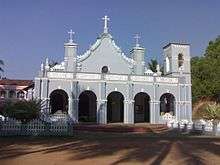Church of Most Holy Saviour, Agrar
| Agrar Church | |
|---|---|
| Church Of Most Holy Saviour, Agrar | |
 | |
 Agrar Church | |
| 12°54′52″N 75°03′08″E / 12.9145°N 75.0521°ECoordinates: 12°54′52″N 75°03′08″E / 12.9145°N 75.0521°E | |
| Location | Bantwal, Dakshina Kannada district, Karnataka |
| Denomination | Roman Catholic (Latin rite) |
| History | |
| Founded | 1702 |
| Administration | |
| Parish | Church of Most Holy Saviour |
| Diocese | Roman Catholic Diocese of Mangalore |
| Province | Roman Catholic Archdiocese of Bangalore |
| Clergy | |
| Archbishop | Most Rev. Bernard Blasius Moras |
| Bishop(s) | Rev. Aloysius Paul DSouza |
| Vicar(s) | Rev. Fr. Benjamine Pinto |
The Church of Most Holy Saviour also known as Agrar Church is a historic Roman Catholic Church situated in the locality of Bantwal. The church was built in 1702,[1] but it is believed that the existence of church was prior to this. It is the one of the oldest churches in Dakshina Kannada district. This church comes under Roman Catholic Diocese of Mangalore. Currently Rev. Fr. Benjamine Pinto serves as the parish priest at this church.
History
Agrar means the village of Brahmins and is derived from the Kannada word Agrahara. Once the most extensive parish of the Diocese of Mangalore, extending from Bantwal to Charmadi borders and from the Nethravathi river to the Gurupur river, it is certain that the Agrar church existed even prior to the founding of the Bantwal church in 1702 by Fr. Miguel Dmello. There are no records available to show the exact date of the origin of the church at Agrar. Fr. Jose da Costa was the Vicar at Agrar in 1751. Tipu Sultan had demolished the first church. It was rebuilt on the same foundation after the return of the Christians from the captivity. No chronological list of the parish priests prior to 1801 is available. The church was rebuilt, expanded, and renovated by Fr. Camil Baretto in 1889. Br Moscheni S.J., artistically painted its sanctuary in 1902. Fr. R.F.C. Mascarenhas built the presbytery in 1914. The church has been renovated on the occasion of the tricentenary of the founding of the parish in 2002.
New parishes of Most Holy Redeemer Church, Belthangady in 1885, Church Of Sacred Heart Of Jesus, Madanthyar in January 1893, Siddakatte on May 1, 1926, Nirkan on May 25, 1930, Allipade on May 22, 1938 Loreto on November 1, 1939, and Farla on December 8, 1994 were carved out of this once extensive parish. The Agrar parish manages and runs two Schools known as Agrar Church Higher Primary School and Christa Jyoti High School.[2]
Demographics
The parish has 311 families with a population of 1492 members as of September 2011.[3]
Significance
Being one of the oldest church, Agrar church is also famous for many organizations which started under the supervision of church administration. St. Ann's Convent at Agrar, St. Ann’s of Bangalore Convent at Agrar, Agrar Church Primary School, Holy Saviour English Medium School and Christa Jyothi High School are administered and supported by Agrar Church.[4]
Most Holy Redeemer Church, Belthangady is the daughter church of this parish.
The church is built in the Baroque architecture style. Its frescos and paintings on the altar are beautiful and well renowned showing Jesus sitting with his Apostles and clearly portraying the artistic touch of Br. Antonio Moscheni, who also painted the St. Aloysius Chapel in Mangalore in the style of Sistine Chapel in Vatican City.

People
The parish has been famous as the place of origin for a large number of priests and nuns. The notable ones are as follows:
- Rev. Dr.Aloysius Paul D'Souza, Bishop of Mangalore Diocese
- Rev. Dr.Gerald Isaac Lobo, Bishop of Udupi Diocese
- Rev. Dr. Pius Thomas D’Souza, Bishop of Ajmer
.jpg)
.png)
See also
- Roman Catholicism in Mangalore
- Goan Catholics
- Deanery of Belthangady
- Most Holy Redeemer Church, Belthangady
- St. Patrick Church, Siddakatte
References
- ↑ "Agrar Parish". www.dioceseofmangalore.com.
- ↑ "Agrar Parish". www.dioceseofmangalore.com.
- ↑ "Agrar Parish". www.dioceseofmangalore.com.
- ↑ "Agrar Parish". www.dioceseofmangalore.com.